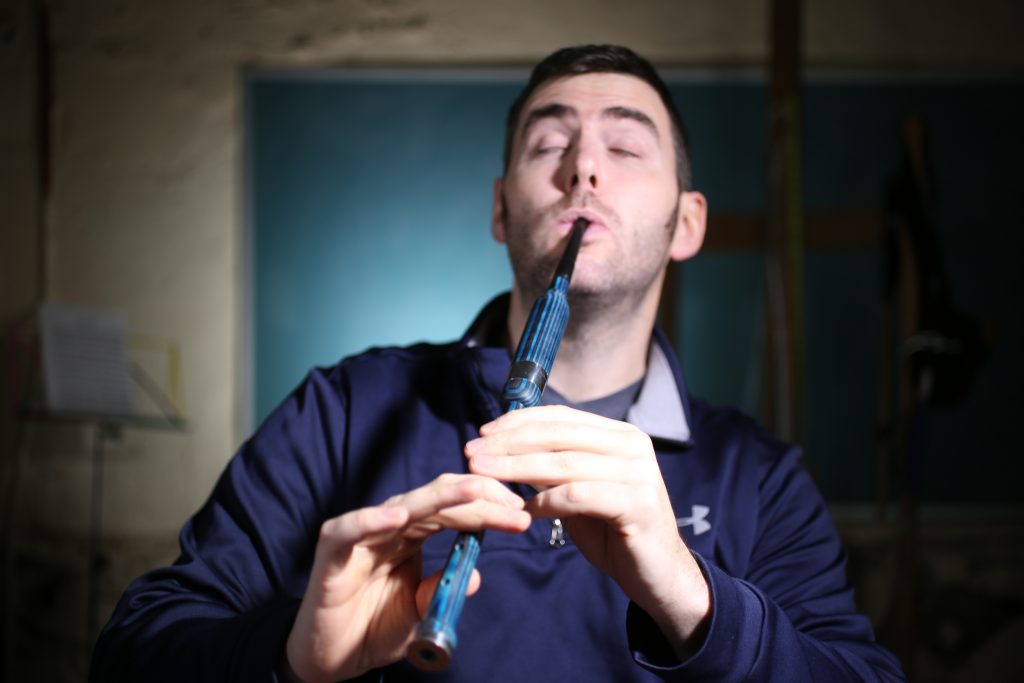Glen Fletcher: Slow and Steady

I always wanted to play the pipes since I was a kid. Never got around to it until later in life. It finally got to the point that I figured that if I didn't start soon, I never would learn them. So I contacted a local band and finally hunkered down and learned the basics.
Originally, I just wanted to learn the bagpipes. My perception on piping in general was that you played in a band and competed at the Highland games. So that was my intention at first. Then I learned that there were bands that didn't compete and there were pipers that were not part of any band. Some didn't even compete and played just for the fun of it. Once I got started learning the pipes, I realized that it would take a while before I could play at the speed that bands play at, never mind compete with them. So I decided to focus on learning enough to compete in solo competitions, with the longer term goal of joining a band. I always wanted to be a part of the massed bands at the highland games. But first, I wanted to be able to play reasonably well if not good as the quality of my playing has always been important.
My inspirations for becoming a piper was listening to the great Ontario bands and pipers of the late 70s and early 80s. Many of the top pipers, teachers and pipe makers of today were in their prime. I was privileged to grow up listening to some of the best piping in the world. At one time, as a child, I helped carry the championship trophy off the field at the North American pipe band championships with a band that I had been hanging around. I had become friends with the son of a piper in the band and had ended up spending quite a bit of time over many highland games with the band. It was an experience that I still look fondly on decades later. So there was never a specific point in my past that I wanted to become a piper... It was always something that I would eventually become.
One of my key struggles as a learning piper was knowing the tunes but not being able to play them. A secondary stumbling block that I was not aware would be an issue was that my brain knew the notes to play but my fingers wouldn't cooperate. Apparently, this is a common problem with people that learn at a "more advanced age". I knew taking up the pipes earlier could have been easier!! There were also a few things in pipe maintenance that caused a lengthening of the learning process.
Every once in a while, some limiting beliefs rear their ugly heads and make continuing a struggle. Too old, should have started earlier, I will never be able to play as fast as they play in the massed bands and I should know this stuff by now are a few of the things that have caused a challenge.
I once considered somewhat quitting the pipes about a year after I started learning. I had recently transitioned to the full pipes and was frustrated. I had finally learned how to play Scotland the Brave and knew that something in my playing didn't sound right. I know how it is supposed to sound as I have listened to bands and pipers playing it since I was born... But I couldn't get it to sound that way (nor play it any faster either). Thankfully, months later, a fellow learning piper who was a little more advanced than I was at the time, encouraged me to "keep at it". I figured I would give it another shot and picked up the practice chanter again...
So, all alone and with no instructor, I got on my computer and started looking for tutorials online. I found quite a few good ones and quite a few bad ones too. Somewhere in my travels I encountered a couple of videos of a guy named Andrew. He seemed to know a bit about piping. The issues he covered and the points he made resonated with my experiences as a struggling beginner. I kind of liked this "Dojo University" idea. Higher study of piping with martial arts discipline... hmmm... that makes sense. Piping isn't just learning an instrument. It is a way of life. I checked it out just to see if it would be worthy of the university tag...
I got sucked in by the excellent marketing strategy that was laid out before me. Aside from that, the concept behind the Dojo was sound. I had gone through the typical band recruitment strategy enough to have gotten frustrated at my lack of progress and even more frustrated that my instructor in the band couldn't identify why. The Dojo offered a unique and different way to learn from the ground up. I signed up for the free month. Figured it couldn't hurt and there was so much to gain...
When I found out the instructors were top notch pipers, It helped a lot to warm up to the Dojo. I always thought that someone who was successful in their field was more than qualified to teach it. In addition to the welcoming and encouraging manner of the instructors, I found that I was not alone in my struggles to learn piping. There were a lot of people that had much the same struggles. The global nature of an online community opened my eyes to a lot of issues that others have. It made me realize that if they can overcome their unique problems, than I can too! There are many different people a part of the Dojo, at many different stages along the path to piping greatness. It is very encouraging to be able to help those who are newer to piping than I am and still learn from those who are more advanced. I have been a member of the Dojo ever since...
The Dojo has benefited my piping without question. I have learned so many things, from just how much I should have learned in the first place to how the journey I am on can and will be a much more enjoyable venture than I thought. That is not to say it will be easy. There is help to be had and blueprint to follow that is a bit different than other methods to be had out there. But it works... and it makes sense...and is focused on the betterment of piping by helping each piper to be better.
Before I joined the Dojo, pipe set up and maintenance was some what of a mystery, only known by the masters and only taught to players when they had obtained a certain unknown level of playing. Afterwards, I was enlightened to the fact that drone reed calibration, chanter reed manipulation and even tuning was within the realm of the beginner. The ease in which the process was taught through various courses and finer points clarified through live and recorded classes, made playing the pipes a joy. I still struggle sometimes and it still isn't easy, but so much better to know that joy is just around the corner instead of far, far away.
The Dojo has laid out the process of tuning to such the extent that even in my first season of competition in Grade 5, the judges remarks were consistently "drones well set" and "chanter good". I never thought that would have been possible before.
Learning tunes has become much easier with the constant variance method taught at the Dojo. The tune of the week is a challenge but there is never the pressure to do it perfect. Recognizing common phrases and learning the common rhythms of different types of tunes has increased my sight reading skills. There is always another tune to try out next week!
My fingering has improved through exercise classes. Slow and steady wins the race. The focus on well executed tunes without worrying about how fast to play it has allowed me to start playing tunes faster, sooner and better than ever before.
With the Dojo, I have gotten further on in my piping than I ever would have anywhere else. I am happy to play a pipe that sounds good and know that is set up, tuned and taken well cared for. I am more confident to play in front of people knowing that speed matters little, it is the wonderful sound of the pipes they want to hear. Now a days, I am able to do just that.
Glen Fletcher, Barrie, Canada





